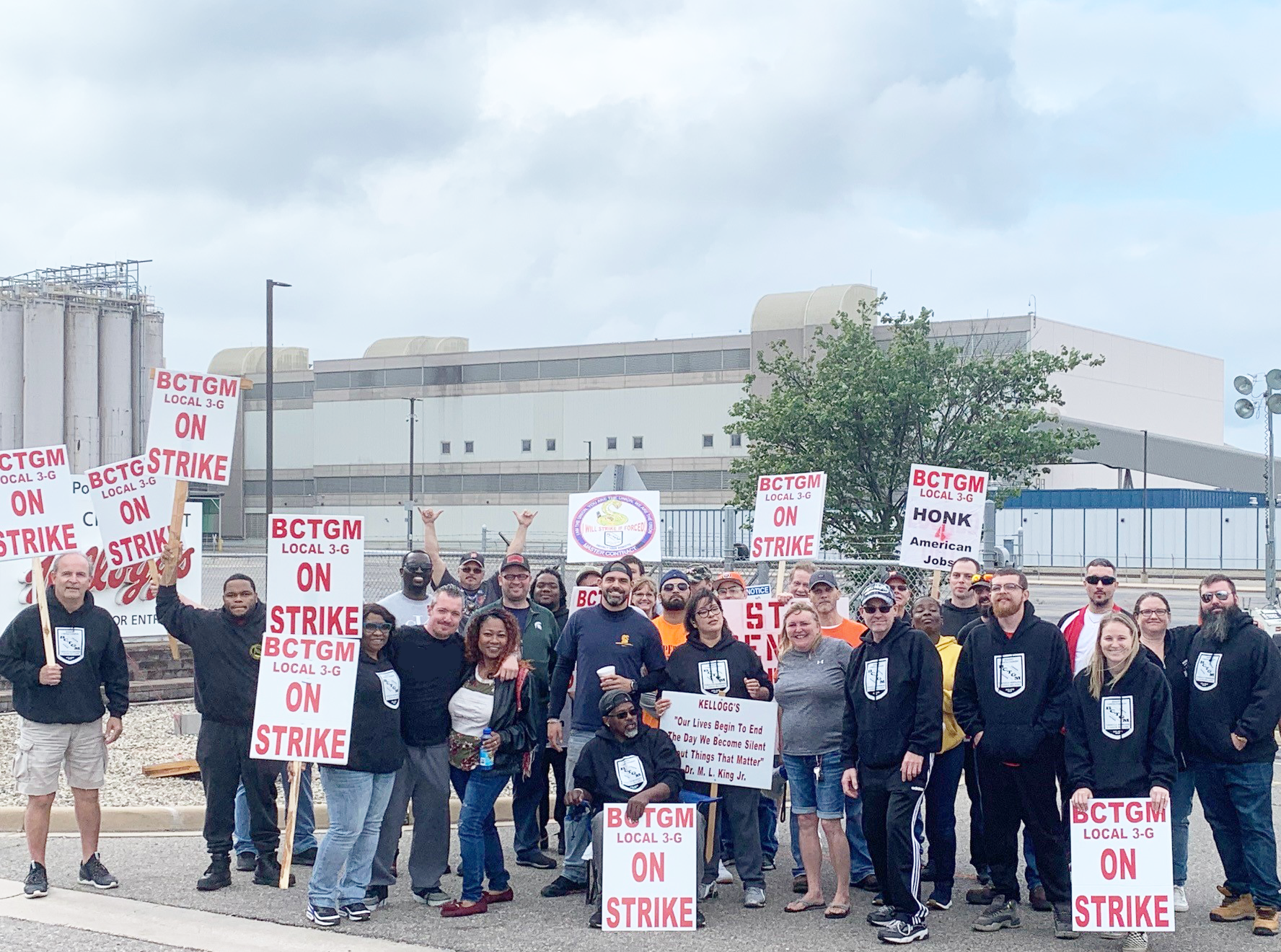Feeding Strikers Fuels Victory!
“When workers are supported by members of their community, they are much more successful and likely to have their demands met. ”

Every day, it seems, there’s yet another collection of workers who decide to take a stand and demand better conditions in their workplace. In January alone, there are the BNFS railway workers who are being prohibited from striking due to a federal judge’s ruling; 54 Starbucks locations in 19 states that have seen their workers stand up unions; group home workers in Hartford, Connecticut are on their fourth month of striking. And these strikes seem to continue to achieve exactly what they set out to do: improve working conditions.
Striking has a long history in the United States, alongside collective bargaining. They are the reason the 40-hour workweek exists, the reason OSHA and safety requirements exist, and the reason why minimum wage laws exist.
The success of these actions is often determined by the amount of support the fighting workers have, often in the form of strike funds, public support/pressure, propaganda, and other actions.
Perhaps you’ve heard of the actions we mentioned above or of another organizing effort going on in your neighborhood, and you’ve always wanted to assist and contribute but you didn't know-how. Here are some ways you can help support your fellow worker as they fight for the rights of us all:
- Ask the workers what their needs are
- Join the picket line
- Participate in a boycott
- Create art and media to spread awareness and put pressure on management
- Participate in mutual aid
The first and most important part of aiding workers in collective actions is knowing if they want your help. Oftentimes, the answer is yes. What tends to not be clear is how they would like for people to support them. Usually, organizations will be communicating with the public to spread awareness and looking for voluntary contributions in the form of money and/or time. This means everything is on a case-by-case basis. Not all actions or strikes want you to boycott while they strike. It is very important that you communicate with the people you want to help and meet their needs first. This is what separates charity from mutual aid.
Plainly, mutual aid is helping out people in your community. This can be different from charity when it is done by providing people in your community with what they have communicated their wants and needs to be, especially when this exchange goes both ways in which it is not clear who is giving and who is receiving. More simply, it is taking from those who have and providing it to those in need. For example, a houseless neighbor communicates that they need shelter, so another community member gives them a spare tent their family had. These systems can be intricate and develop into entire organizations seeking to fulfill an unmet need in their community, i.e. Heaterbloc.
When workers are supported by members of their community, they are much more successful and likely to have their demands met. Recently, the Socialist Rifle Association assisted the Bakery, Confectionary, Tobacco Workers, and Grain Millers International Union (BCTGM) workers based out of Lancaster Pennsylvania by establishing a community refrigerator in the union office. We got to talk with a couple of our members who participated in this and get their side of the story. Joe Crouse (he/him) and Gabriel Siciliano (he/him) from the Philly Chapter of the S.R.A. share their experience with us. “We were pretty active in helping out with the UAW strike in Langhorne,” Joe recalled.
In the Fall of 2019, UAW workers went on strike to fight for “fair wages, health care, a share of the profits, and job security.” While helping out with the strike and talking with workers, Joe learned about the food situation on the pickett line.
“What we learned from the UAW strike was they got a lot of food but… it's a lot of snacks, it's a lot of pizza, it's just something that they can eat on the picket line. The problem was they weren’t getting enough food to take home to their families. Which is one of the bigger costs… because they only get so much money out of the strike fund every week.”
“The union is paying people out of their dues… for necessities and groceries on a weekly basis which means they have to operate on pretty extreme budgets. Which means basically no fresh food,” Gabe explained to us.
Feeding yourself on a small allowance is hard enough as it is; feeding a family can be exponentially harder. Ensuring that you’re maintaining a balanced diet becomes an afterthought.
When the BCGTM strike in Lancaster, PA was starting, Joe decided to reach out and gather information about what the workers needed. “I went to a rally with the union shortly after they started striking. I approached some of the organizers, one with the DSA and one with BCTGM. I said, ‘Hey, we have a lot of resources for our own mutual aid programs. If we can help with consistent grocery deliveries, we would love to do that!”
To pull off such a task, they were going to need some help from other local groups working on similar projects. Working with groups who are fulfilling a need you want to help meet is the most efficient way to accomplish that goal. In the words of Gabe, “We have Central New Jersey DSA, Central New Jersey YDSA, Food Not Bombs, a couple of other smaller mutual aid [groups] dropping stuff off.” They were, “disbursing the involvement over as many people as we can get,” according to Joe. “Most of the work for this project comes from people driving in a relay system from the farm in New Jersey to the union picket line in Lancaster, Pennsylvania.” This coalition would wind up teaming up with a local family farm to provide fresh produce to the strikers. “It’s my family’s farm,” Gabe says, “Abe’s Acres Farm… called after my great-grandfather [...] I always have stuff left over. [...] The way that it works is I had an extra fridge/freezer. I drove that out to them, set it up in their office. Every week, someone comes up to the farm from Philly, picks up produce from me and other dry goods.”
Together, they managed to coordinate a system for making sure the fridge stayed full. “I came back to SRA after talking with the union organizers and talked with Gabe, and we figured… we got 17 people together and set up this driver schedule,” Joe told us.
Gabe explained the logistics at play, “Whoever comes out to the farm picks up that stuff, picks up the coolers full of produce that I packed, drives to Philly, someone from Lancaster comes out, there’s a handoff, and then they drive out to Lancaster, and they just stock it up and make sure it is there for the union folks.”
When asked about how the aid was received by the workers, this is what they had to say:
“At first, they were definitely appreciative, especially the higher-ups in the union,” said Joe. “The first day… I went up there and I spoke with our union contact who was very, very grateful and exceedingly deferential and just wanted to make everything work,” Gabe said reflectively. “When I drove up with the fridge and the first delivery, he met me there with five guys all off the picket line and helped me unload it, ushered me in. The president of the union, who has been on the phone pretty much since this all began, trying to organize everything, took the time to thank me personally… They were all exceedingly grateful.”
As the weeks passed, Joe and Gabe told us the honeymoon/feel-good phase was gone and the support began to feel like work. As Joe puts it, “after a few weeks, it started to become routine and people were expecting us. [...] That was a moment for us where we talked about it in our chat… At first, that good feeling you get for doing something good for somebody is there, but then after a while, it definitely fades away and it definitely becomes work. An important part of the effort was we had to stick with it past that warm fuzzy feeling [wearing] off.” “It is an effort of consistency,” adds Gabe.
When you do mutual aid and other community organizing, you are prone to burnout and compassion fatigue. Being aware of this and creating plans to work through and around it is important for the longevity of a project and the health of the organizers. Self-care should not be neglected. As Joe puts it, “We have to create a system that is robust enough to outlast people’s feelings of goodwill.”
We have to remember why we are out here doing the work. Why we continue to show up every day and put in the time and effort.
“They were a little bit mystified that anyone gave enough of a shit to come help them,” Gabe reported. As workers, we are isolated from other workers and industries. All too often workers will unite and take collective action to empower themselves in the workplace while going unnoticed and feeling unseen by the rest of the workforce. This is why it is critical that we reach out and provide support as best we are able. “They [management] don’t give a shit about the worker. That’s why this is a problem. It’s up to us to give a shit past when it makes us feel good,” Joe emphasized.
We don’t do this just to make ourselves feel good. Humans are social creatures, we are built to be cooperative and stand together. Working together makes the load lighter. And we do it because we know no one else will.
We Protect Us!
